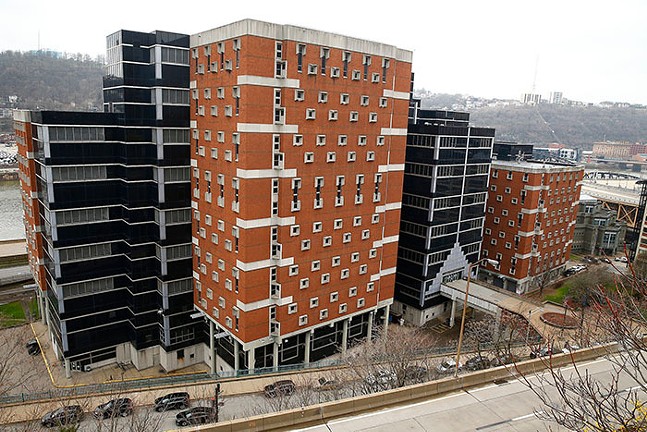"Because [Allegheny County Jail] correctional staff do not know when someone is manifesting symptoms or is unable to comply with directives due to their mental illness, they punish individuals rather than referring them for treatment or accommodating their illnesses. Because they do not deescalate, individuals receive much greater punishment than necessary."
Audit calls for greater access to support for incarcerated parents and their kids
A recent audit of county jail conditions found the majority of children with incarcerated parents do not receive supportive services.The audit's author, Allegheny County Controller Corey O’Connor, recommends changes to eligibility requirements and increased outreach to ensure more children are able to access these services.
“Being in jail for even a single day puts a monumental strain on a family’s dynamic. DHS can and should address this critical time by reaching out to caregivers to provide information and confidentially assess their need for support,” O’Connor says.
O'Connor also serves on the Jail Oversight Board.
The controller’s office considered data from Jan. 1, 2021, to Sept. 30, 2022, during which time 5,220 caregivers were at some point held in the jail, impacting almost 12,000 children. More than three-quarters were under the age of 12 at the time of their parent's incarceration.
Only 39% of those children received supportive services from the Department of Human Services within one year of their parent’s incarceration, O’Connor’s audit found. DHS contracts with Amachi and Pittsburgh Mercy to provide mentoring and family support services, however, the study suggests the majority of caregivers incarcerated at the jail do not meet the eight-week minimum duration to qualify for these services.
In a written response, Department of Human Services Director Erin Dalton suggested the remainder of children unenrolled in county services may not need them but acknowledged family support services should be available to all incarcerated people.
DHS awarded Amachi $150,000 per year in 2021 and 2022 to support its mentoring programs. Pittsburgh Mercy received $127,795 in 2021 and $97,964 in 2022 for their parenting and relationship classes for incarcerated parents.
Other Jail News
“GROSSLY INADEQUATE”
TribLive summarized new evidence in a federal lawsuit accusing the jail of neglecting and abusing people with mental illnesses, which could constitute as many as three-quarters of all the people incarcerated there. An expert psychiatrist investigated conditions at ACJ and determined mental healthcare there is “grossly inadequate.” His report says incarcerated individuals “universally” said correctional staff mock them if they mention suicidal thoughts and that “they can be beaten or tased for even asking to meet with mental health staff.”
JUST PLAIN GROSS
A recent survey by the Pennsylvania Prison Society on jail conditions confirms the findings of an earlier study conducted by the University of Pittsburgh that the majority of people at the jail go to bed hungry and many report being served rotten food or seeing rodents, bugs, and rodent droppings on their food trays. Respondents also raised serious concerns about delays in medical care and abuse from corrections officers and staff.
OVERTIME OVER BUDGET
Action News Investigates found that the Allegheny County Jail spent almost $10 million on overtime costs last year, up by $1.5 million since 2019. Jail administration uses mandatory overtime to compensate for lack of correctional staff. Although the Allegheny County Prison Employees Independent Union consistently raises concerns about the negative effect of compulsory overtime on safety and morale at the jail, Warden Orlando Harper told Action News he’s not concerned about rising overtime costs.
APPLICANT POOL
WESA reports that Bethany Hallam, an at-large member of Allegheny County Council who also serves on the Jail Oversight Board, introduced an ordinance that would lift a requirement that jail employees live inside the county. Hallam reportedly hopes eliminating the residency requirement would help ease staff shortages at the jail. The ordinance has been referred to the Committee on Public Safety.
Who was in the jail this month?
Source: Allegheny County Analytics unless otherwise specified
From Feb. 1, 2023 to Feb. 28, 2023
Average daily population of jail and alternative housing: 1,684 individuals.
Gender: Most people in the jail are men. Women make up about 11% of the jail population. It’s unclear how many trans, nonbinary, and/or gender nonconforming people there are in the jail.
Race: Sixty-seven percent of people incarcerated at the jail this month were Black. Allegheny County as a whole is 13% Black.
Children: Twenty-eight individuals under 18 are currently held in the jail, making up approximately 2% of its average daily population.
Senior citizens: One hundred seventy-six individuals over the age of 65 are currently held in the jail.
Isolation: According to the jail’s monthly segregation report, on most days in January 2023, at least one pod was on lockdown. Besides the individuals affected by those lockdowns, the jail also reports almost 100 individuals spent at least one day in solitary confinement in January 2023, with the longest duration being 16 days.
COVID-19: According to the segregation report did not include information about COVID-19 at the jail.

















